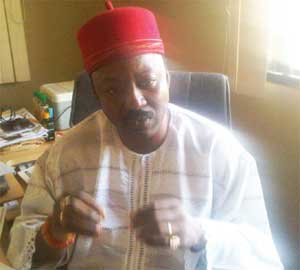Presidential candidate of NCP, Martin Onovo, in this engagement with Assistant Politics Editor, DANIEL KANU, speaks on his preparedness to fix the country, if elected in February, among other issues.
You contested the 2011 presidential election on the platform of Action Alliance (AA). Why have you left the party for the National Conscience Party (NCP)?
It is important that you know I was originally in the NCP before I went to the AA. Our founder, Gani Fawehinmi, insisted on principles and never shifted ground on that. Based on the disagreement I had with a faction of the leadership and since it became irreconcilable at that time, I left NCP and went to AA. But I am back to my natural home, and I hope you must recognise that I come from an activist background, having been a students’ union leader, having been president of engineering students at the University of Ibadan and the national vice president of engineering students in the country in the 1980s. My background has always been on activism, and this is the party of activists. The number one activist in the history of Nigeria was Fawehinmi, Senior Advocate of the Masses (SAM), and we must keep that memory alive if Nigeria must be rescued. The truth is that I am prepared for the challenge ahead.
What, in clear terms, are your cardinal objectives if you become president?
In our campaign speech on December 17, we made two general promises and three specific promises. Why did we do that? We had to put the general promises to cover every sector because, as at today, we have an emergency in the housing, education, agriculture sectors, as well as in security, etc. You cannot really ignore any sector because all the sectors are linked. So we made two general promises: that we will do what is right. In a single sentence, all that we have promised is good governance. We said we will lead by example. We also promised that we will do what is right to all manner of men. Then we made specific promises based on which we can be bench-marked, performance-wise.
We said we will reduce fuel price. You may ask how we are going to do that. That is simple; we will increase the number of domestic refineries. This high cost you see is corruption and waste. It doesn’t make sense to produce crude oil, go abroad to refine and ship it back to the country. In the entire Organisation of Petroleum Exporting Countries (OPEC), it is only Nigeria that is doing this dysfunctional thing of producing crude oil, going outside the country to refine it and bringing it back. No other country behaves that way. Under the late Head of State, Sani Abacha, when he did that, domestic cost was N11. Market dynamics have changed, and we expect that given current dynamics, it will be less than N50 in our time. All that we have promised, we have told Nigerians how we are going to do them. Those are specific promises.
We also promised to increase minimum wage by reducing the maximum wage. The total wage bill will not increase, and there will be no inflation. What we will do is the real re-distribution of the wage bill. Let us use the United States of America as a case study. In the U.S., the minimum wage is $10,000 per annum. The U.S. president earns $400,000 per annum. In Nigeria, the minimum wage is N18,000 per month, which is about N216, 000 per annum. Now when you check the benefits of a National Assembly member, it’s about 1,500 times the minimum wage. You can see the difference and that does not make sense. So, what will I do when I become the president? I will take a wage cut. Everybody on the high side must take a wage cut and that is what we will re-distribute to raise the minimum wage. We will find out how much we can get from the over-paid to use to lift the under-paid. So there will not be any need to be afraid of inflation because the wage bill is not increasing with our strategy.
We also made a third promise that we will use $9 billion in two and half years to double power. This is one of the most supposedly mythical challenges Nigeria has had.
Financial Intelligence says that since 1999, total expenditure in the power sector is about $51 billion. Since they did that, we cannot say there is appreciable improvement from the 3,000 megawatts we have always had. So where did the $51 billion go to? In our two and half years, we will put down $9 billion to double what is on the ground. We have done it in the organised private sector (OPS). So I am not telling you what is impossible. But you know that once there is falsehood, simple things become confused. Ghana has achieved it. Are you saying that Ghana has more resources than us to achieve such feat? So I am not telling you what is far-fetched or impossible.
The ministry of corruption consumes more money than any other ministry in the country, and we have our strategies to deal with corruption. They are enlightenment, example (we will lead by example), empowerment. Empowerment of people is important where the wages are enough to sustain them. We will not experience what Prof Itse Sagay calls the iron law of survival where you are compelled to be corrupt because your take-home pay cannot in reality take you home. We must raise the minimum wage to a point where it can pay for transportation, food, housing and other minimum requirements for life. The minimum wage we have today is not even enough to pay for transformation, and the result is that the people are compelled to be corrupt. The last one is enforcement. The first thing is to get to a point where they don’t have the reason to be corrupt, where the leadership is not leading them to corruption because once the leadership is corrupt, the followership will be a victim. And to get to this point where this nation will be restored again is to vote for the NCP. When we get to this point, corruption will be at its lowest ebb, so the few individuals that refuse to comply, the rule of law will apply. Those few we have enough prison space for them. When you get a leadership with integrity that leads by example and dictates the standard, violators will face enforcement and that way it becomes easy to enforce.
You promised that Nigeria under your government will increase the minimum wage. Experts, however, say it is the value of the money that matters. How do you reconcile this with the Nigerian situation?
This question is better discussed around inflation because the only macro-economic index that should be affected when you increase wages generally will be inflation, and that is what we have taken care of when we said we are not increasing wages generally; rather we are increasing minimum wage by reducing maximum wage. So the first thing is that those in the minimum wage have better purchasing power because it has no inflationary effect. We should be discussing what is causing inflation in Nigeria because it is not the minimum wage that we are going to increase that will cause inflation. We said we will increase minimum wage by reducing maximum wage while maintaining the total wage bill. It’s very clear what we intends to do. You have inflation because government prints money and why does government print money? This is because governments in this country have been reckless.
But Nigerians are alleged to have chronic appetite for foreign goods.
I disagree with that because the reason is that we don’t have local production. Provide local alternative with good standard and Nigerians will go for it. When you cannot refine your crude, when you are not producing anything here, even toothpicks, where manufacturing companies have closed, what do you expect Nigerians to do? You have to import, if you are not producing. The appetite you are talking about is because Nigerians have no choice; so they go for foreign goods. Provide Nigerians with homemade products of higher quality standard and they will go for them. So what you are saying is a wrong assumption that must be corrected. When we start producing competitively, Nigerians will no longer prefer foreign goods. The number one criterion for leadership is integrity, and if we fail to get it right this time, the nation is doomed. From the choice of a leader, you know the lieutenants. From what we have now, I can tell you we need a change and I can competently provide that needed change. Nigeria is easy to fix, and that is a reality.
Do you have confidence in the capacity and preparation of the Independent National Electoral Commission (INEC) so far to conduct a free and fair poll?
The only way, professionally, to predict the future is by looking at the past with the records you have. If you look at previous performances of INEC, you look at the last Anambra State election, you look at the Permanent Voters Card (PVC) issues, it becomes obvious that INEC has very serious performance issues since 1999. It’s either INEC is unwilling to deal with the issues or has been affected by the same leadership problem that has caused decay in infrastructure, ethical standards, compliance to laws etc. It will be wrong to say that INEC has an acceptable level of performance. They will need to demonstrate that in the future. You know the case of Lagos State Governor, Babatunde Fashola, not getting his PVC. Imagine a governor having such a problem, what of ordinary people? There are so many people that could not get their PVCs. So, you can imagine the millions that will be disenfranchised. I am suspecting an unwillingness on the part of INEC or that the leadership problem in Nigeria has affected INEC to the point that it cannot deliver on simple routine political exercise.
With the scenario you are painting, why are you still in the race?
I am in the race to correct the system. If we don’t complain and don’t try to change it, it means that we are happy with what is happening. I am challenging the system because I know I can make things better.
What will be the thrust of your foreign relations?
Foreign relations is very critical, especially now that borders are collapsing. Once you have clear objectives, a structure and world class management system in place, you can manage it. The management system will dictate what your objectives are, interest, your scope, your workforces, and your feedback system for corrective action and update processes. We have to use the Nigerian Intelligence Agency (NIA), the Nigerian Institute of International Affairs (NIIA) and the Ministry of Foreign Affairs to develop clear priority objectives of foreign commitments. Once your purpose is clear, then you can align your activities to achieve that purpose. We have to define what we intend to achieve and that is why I will not give it out here. But trust me, our national interest must come first.














